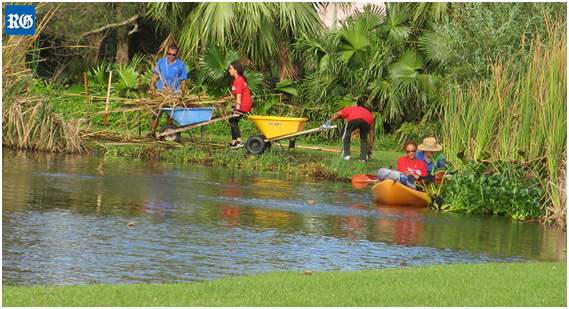Recent News
Returning shark brings slew of new dataFriday, September 07, 2012
FRIDAY, SEPT. 7: A tiger shark that was tagged in Bermuda in 2009 has turned up near the island again three years later.
Former aquarium shark enjoys life on the wild side
Friday, September 07, 2012
FRIDAY, SEPT. 7: Osbourne the aquarium shark seems to be thriving in the wild.
Video: Aquarium Shark Released Into The Wild
Monday, August 27, 2012
“Osbourne,” a 7-year-old Galapagos shark, was released into the wild in March of this year after spending the past 6 years at the Bermuda Aquarium.
Young conservationist’s career ambitions take flight
Saturday, August 25, 2012
Most Bermudians feel a justifiable familiarity with the iconic longtails that teem to the Island during the warmer months — apprentice conservationist Miguel Mejias gets to work alongside them.
Website allows the public to follow the travels of five turtles caught in local waters
Wednesday, August 15, 2012
Five unsuspecting turtles yesterday are participants in the Bermuda Tour de Turtles, a three-month race through the Island’s waters.
About
GovernanceAbout Us
Newsletter
Latest News
Gift & Bookstore
Contact
General Inquiries
info@bzs.bm
Latest News
All the latest updates and news from the Bermuda Aquarium, Museum, and Zoo, one of Bermuda's leading visitor attractions!
Jonathan Bell
Published Jan 16, 2018 at 8:00 am (Updated Jan 16, 2018 at 6:41 am)

HSBC volunteers help a Bermuda Zoological society team clean up
Cloverdale Pond in Smith's (Photograph supplied)
Two ponds have been cleaned up courtesy of an island conservation programme.
Cloverdale Pond in Smith’s and Southampton’s Evan’s Pond, a refuge for endangered species, were improved through the Bermuda Zoological Society’s wetlands remediation programme.
The scheme, which became the HSBC global water programme for Bermuda in 2014, was designed to remove toxic petroleum compounds from ponds.
The build-up of the poisonous hydrocarbons is a threat to the island’s two endemic killifish species, as well as native diamondback terrapins, which are a protected species.
The compounds, which come from oil, water runoff and vehicle exhausts, can be broken down by bacteria when the pond sediments are aerated.
The two-year grant from HSBC allowed the proposal to be tested in the field.
Volunteers also took part, with help from the Department of Environment and Natural Resources.
The BZS said Cloverdale was chosen first because of its small size, its “known severe effects on wildlife” and the absence of protected species in the water.
Evan’s Pond was selected as the second test site because of its small population of killifish.
The ponds were divided into sections and aerated for six to eight hours a day with solar powered compressors.
Hydrocarbon levels saw a major reduction over the course of a year.
The next site for remediation is the South Pond at the Mid Ocean golf course, where the hatching of diamondback terrapins has been hampered by pollution.


